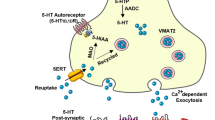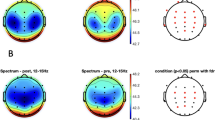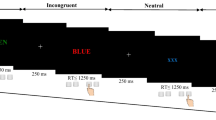Abstract
Rationale
Disruption of auditory event-related evoked potentials (ERPs) P300 and mismatch negativity (MMN), electrophysiological markers of attentive and pre-attentive cognitive processing, is repeatedly described in psychosis and schizophrenia. Similar findings were observed in a glutamatergic model of psychosis, but the role of serotonergic 5-HT2A receptors in information processing is less clear.
Objectives
We studied ERPs in a serotonergic model of psychosis, induced by psilocybin, a psychedelic with 5-HT2A/C agonistic properties, in healthy volunteers.
Methods
Twenty subjects (10M/10F) were given 0.26 mg/kg of psilocybin orally in a placebo-controlled, double-blind, cross-over design. ERPs (P300, MMN) were registered during the peak of intoxication. Correlations between measured electrophysiological variables and psilocin serum levels and neuropsychological effects were also analyzed.
Results
Psilocybin induced robust psychedelic effects and psychotic-like symptoms, decreased P300 amplitude (p = 0.009) but did not affect the MMN. Psilocybin’s disruptive effect on P300 correlated with the intensity of the psychedelic state, which was dependent on the psilocin serum levels. We also observed a decrease in N100 amplitude (p = 0.039) in the P300 paradigm and a negative correlation between P300 and MMN amplitude (p = 0.014).
Conclusions
Even though pre-attentive cognition (MMN) was not affected, processing at the early perceptual level (N100) and in higher-order cognition (P300) was significantly disrupted by psilocybin. Our results have implications for the role of 5-HT2A receptors in altered information processing in psychosis and schizophrenia.





Similar content being viewed by others
References
Albrecht MA, Martin-Iverson MT, Price G, Lee J, Iyyalol R (2011) Dexamphetamine-induced reduction of P3a and P3b in healthy participants. J Psychopharmacology (Oxford, England) 25(12):1623–1631. https://doi.org/10.1177/0269881110376686
Bebbington P, Nayani T (1995) The psychosis screening questionnaire. Int J Methods Psychiatr Res 5:11–19
Bramon E, Rabe-Hesketh S, Sham P, Murray RM, Frangou S (2004) Meta-analysis of the P300 and P50 waveforms in schizophrenia. Schizophr Res 70(2-3):315–329. https://doi.org/10.1016/j.schres.2004.01.004
Brockhaus-Dumke A, Schultze-Lutter F, Mueller R, Tendolkar I, Bechdolf A, Pukrop R, Klosterkoetter J, Ruhrmann S (2008) Sensory gating in schizophrenia: P50 and N100 gating in antipsychotic-free subjects at risk, first-episode, and chronic patients. Biol Psychiatry 64(5):376–384. https://doi.org/10.1016/j.biopsych.2008.02.006
Butcher JN, Graham JR, Fowler RD (1991) Special series: The MMPI-2. J Pers Assess 57(2):203–204. https://doi.org/10.1207/s15327752jpa5702_1
Carhart-Harris RL, Leech R, Erritzoe D, Williams TM, Stone JM, Evans J, Sharp DJ, Feilding A, Wise RG, Nutt DJ (2013) Functional connectivity measures after psilocybin inform a novel hypothesis of early psychosis. Schizophr Bull 39(6):1343–1351. https://doi.org/10.1093/schbul/sbs117
Carhart-Harris RL, Leech R, Hellyer PJ, Shanahan M, Feilding A, Tagliazucchi E, Chialvo DR, Nutt D (2014) The entropic brain: a theory of conscious states informed by neuroimaging research with psychedelic drugs. Front Hum Neurosci 8:20. https://doi.org/10.3389/fnhum.2014.00020
Carhart-Harris RL, Muthukumaraswamy S, Roseman L, Kaelen M, Droog W, Murphy K, Tagliazucchi E, Schenberg EE, Nest T, Orban C, Leech R, Williams LT, Williams TM, Bolstridge M, Sessa B, McGonigle J, Sereno MI, Nichols D, Hellyer PJ, Hobden P, Evans J, Singh KD, Wise RG, Curran HV, Feilding A, Nutt DJ (2016) Neural correlates of the LSD experience revealed by multimodal neuroimaging. Proc Natl Acad Sci U S A 113(17):4853–4858. https://doi.org/10.1073/pnas.1518377113
Carter OL, Burr DC, Pettigrew JD, Wallis GM, Hasler F, Vollenweider FX (2005) Using psilocybin to investigate the relationship between attention, working memory, and the serotonin 1A and 2A receptors. J Cogn Neurosci 17(10):1497–1508. https://doi.org/10.1162/089892905774597191
del Re EC, Spencer KM, Oribe N, Mesholam-Gately RI, Goldstein J, Shenton ME, Petryshen T, Seidman LJ, McCarley RW, Niznikiewicz MA (2015) Clinical high risk and first episode schizophrenia: auditory event-related potentials. Psychiatry Res 231(2):126–133. https://doi.org/10.1016/j.pscychresns.2014.11.012
Dittrich A (1998) The standardized psychometric assessment of altered states of consciousness (ASCs) in humans. Pharmacopsychiatry 31(Suppl 2):80–84. https://doi.org/10.1055/s-2007-979351
Donchin E, Coles MGH (1988) Is the P300 component a manifestation of context updating? Behav Brain Sci 11(03):357. https://doi.org/10.1017/S0140525X00058027
Earls HA, Curran T, Mittal V (2016) A meta-analytic review of auditory event-related potential components as endophenotypes for schizophrenia: perspectives from first-degree relatives. Schizophr Bull 42(6):1504–1516. https://doi.org/10.1093/schbul/sbw047
Ehrlichman RS, Maxwell CR, Majumdar S, Siegel SJ (2008) Deviance-elicited changes in event-related potentials are attenuated by ketamine in mice. J Cogn Neurosci 20(8):1403–1414. https://doi.org/10.1162/jocn.2008.20097
Erickson MA, Ruffle A, Gold JM (2016) A meta-analysis of mismatch negativity in schizophrenia: from clinical risk to disease specificity and progression. Biol Psychiatry 79(12):980–987. https://doi.org/10.1016/j.biopsych.2015.08.025
Frohlich J, Van Horn JD (2014) Reviewing the ketamine model for schizophrenia. J Psychopharmacology (Oxford, England) 28(4):287–302. https://doi.org/10.1177/0269881113512909
Geyer MA (2015) Lysergic acid diethylamide and psilocybin revisited. Biol Psychiatry 78(8):516–518. https://doi.org/10.1016/j.biopsych.2015.08.003
Geyer MA, Vollenweider FX (2008) Serotonin research: contributions to understanding psychoses. Trends Pharmacol Sci 29(9):445–453. https://doi.org/10.1016/j.tips.2008.06.006
Gjini K, Arfken C, Boutros NN (2010) Relationships between sensory “gating out” and sensory “gating in” of auditory evoked potentials in schizophrenia: a pilot study. Schizophr Res 121(1-3):139–145. https://doi.org/10.1016/j.schres.2010.04.020
Gouzoulis-Mayfrank E, Schreckenberger M, Sabri O, Arning C, Thelen B, Spitzer M, Kovar KA, Hermle L, Bull U, Sass H (1999) Neurometabolic effects of psilocybin, 3,4-methylenedioxyethylamphetamine (MDE) and d-methamphetamine in healthy volunteers. A double-blind, placebo-controlled PET study with [18F]FDG. Neuropsychopharmacology 20(6):565–581. https://doi.org/10.1016/S0893-133X(98)00089-X
Griffiths RR, Johnson MW, Richards WA, Richards BD, McCann U, Jesse R (2011) Psilocybin occasioned mystical-type experiences: immediate and persisting dose-related effects. Psychopharmacology 218(4):649–665. https://doi.org/10.1007/s00213-011-2358-5
Gunduz-Bruce H, Reinhart RM, Roach BJ, Gueorguieva R, Oliver S, D'Souza DC, Ford JM, Krystal JH, Mathalon DH (2012) Glutamatergic modulation of auditory information processing in the human brain. Biol Psychiatry 71(11):969–977. https://doi.org/10.1016/j.biopsych.2011.09.031
Haigh SM, Coffman BA, Salisbury DF (2017) Mismatch negativity in first-episode schizophrenia: a meta-analysis. Clinical EEG Neurosci 48(1):3–10. https://doi.org/10.1177/1550059416645980
Hasler F, Grimberg U, Benz MA, Huber T, Vollenweider FX (2004) Acute psychological and physiological effects of psilocybin in healthy humans: a double-blind, placebo-controlled dose-effect study. Psychopharmacology 172(2):145–156. https://doi.org/10.1007/s00213-003-1640-6
Heekeren K, Daumann J, Neukirch A, Stock C, Kawohl W, Norra C, Waberski TD, Gouzoulis-Mayfrank E (2008) Mismatch negativity generation in the human 5HT2A agonist and NMDA antagonist model of psychosis. Psychopharmacology 199(1):77–88. https://doi.org/10.1007/s00213-008-1129-4
Horacek J, Bubenikova-Valesova V, Kopecek M, Palenicek T, Dockery C, Mohr P, Hoschl C (2006) Mechanism of action of atypical antipsychotic drugs and the neurobiology of schizophrenia. CNS drugs 20(5):389–409. https://doi.org/10.2165/00023210-200620050-00004
Javitt DC, Sweet RA (2015) Auditory dysfunction in schizophrenia: integrating clinical and basic features. Nat Rev Neurosci 16(9):535–550. https://doi.org/10.1038/nrn4002
Jeon YW, Polich J (2003) Meta-analysis of P300 and schizophrenia: patients, paradigms, and practical implications. Psychophysiology 40(5):684–701. https://doi.org/10.1111/1469-8986.00070
Johnson M, Richards W, Griffiths R (2008) Human hallucinogen research: guidelines for safety. J Psychopharmacology (Oxford, England) 22(6):603–620. https://doi.org/10.1177/0269881108093587
Kahkonen S, Ahveninen J, Jaaskelainen IP, Kaakkola S, Naatanen R, Huttunen J, Pekkonen E (2001) Effects of haloperidol on selective attention: a combined whole-head MEG and high-resolution EEG study. Neuropsychopharmacology 25(4):498–504. https://doi.org/10.1016/S0893-133X(01)00255-X
Kamata T, Nishikawa M, Katagi M, Tsuchihashi H (2005) Liquid chromatography-mass spectrometric and liquid chromatography-tandem mass spectrometric determination of hallucinogenic indoles psilocin and psilocybin in “magic mushroom” samples. J Forensic Sci 50(2):336–340
Kometer M, Schmidt A, Bachmann R, Studerus E, Seifritz E, Vollenweider FX (2012) Psilocybin biases facial recognition, goal-directed behavior, and mood state toward positive relative to negative emotions through different serotonergic subreceptors. Biol Psychiatry 72(11):898–906. https://doi.org/10.1016/j.biopsych.2012.04.005
Kometer M, Schmidt A, Jancke L, Vollenweider FX (2013) Activation of serotonin 2A receptors underlies the psilocybin-induced effects on alpha oscillations, N170 visual-evoked potentials, and visual hallucinations. J Neurosci : Off J Soc Neurosci 33(25):10544–10551. https://doi.org/10.1523/JNEUROSCI.3007-12.2013
Kraehenmann R, Preller KH, Scheidegger M, Pokorny T, Bosch OG, Seifritz E, Vollenweider FX (2015) Psilocybin-induced decrease in amygdala reactivity correlates with enhanced positive mood in healthy volunteers. Biol Psychiatry 78(8):572–581. https://doi.org/10.1016/j.biopsych.2014.04.010
Lee M, Sehatpour P, Hoptman MJ, Lakatos P, Dias EC, Kantrowitz JT, Martinez AM, Javitt DC (2017) Neural mechanisms of mismatch negativity dysfunction in schizophrenia. Mol Psychiatry 22(11):1585–1593. https://doi.org/10.1038/mp.2017.3
Light GA, Braff DL (2005) Mismatch negativity deficits are associated with poor functioning in schizophrenia patients. Arch Gen Psychiatry 62(2):127–136. https://doi.org/10.1001/archpsyc.62.2.127
Marona-Lewicka D, Thisted RA, Nichols DE (2005) Distinct temporal phases in the behavioral pharmacology of LSD: dopamine D2 receptor-mediated effects in the rat and implications for psychosis. Psychopharmacology 180(3):427–435. https://doi.org/10.1007/s00213-005-2183-9
Mueller SC (2011) The influence of emotion on cognitive control: relevance for development and adolescent psychopathology. Front Psychol 2:327. https://doi.org/10.3389/fpsyg.2011.00327
Musso F, Brinkmeyer J, Ecker D, London MK, Thieme G, Warbrick T, Wittsack HJ, Saleh A, Greb W, de Boer P, Winterer G (2011) Ketamine effects on brain function—simultaneous fMRI/EEG during a visual oddball task. NeuroImage 58(2):508–525. https://doi.org/10.1016/j.neuroimage.2011.06.045
Muthukumaraswamy SD, Carhart-Harris RL, Moran RJ, Brookes MJ, Williams TM, Errtizoe D, Sessa B, Papadopoulos A, Bolstridge M, Singh KD, Feilding A, Friston KJ, Nutt DJ (2013) Broadband cortical desynchronization underlies the human psychedelic state. J Neurosci: Off J Soc Neurosci 33(38):15171–15183. https://doi.org/10.1523/JNEUROSCI.2063-13.2013
Näätänen R, Alho K (1995) Mismatch negativity—a unique measure of sensory processing in audition. Int J Neurosci 80(1-4):317–337. https://doi.org/10.3109/00207459508986107
Näätänen RS, Sussman E, Salisbury DL, Shafer V (2014) Mismatch negativity (MMN) as an index of cognitive dysfunction. Brain Topogr 27(4):451–466. https://doi.org/10.1007/s10548-014-0374-6
Nekovarova T, Fajnerova I, Horacek J, Spaniel F (2014) Bridging disparate symptoms of schizophrenia: a triple network dysfunction theory. Front Behav Neurosci 8:171. https://doi.org/10.3389/fnbeh.2014.00171
Nichols DE (2016) Psychedelics. Pharmacol Rev 68(2):264–355. https://doi.org/10.1124/pr.115.011478
Oranje B, van Berckel BN, Kemner C, van Ree JM, Kahn RS, Verbaten MN (2000) The effects of a sub-anaesthetic dose of ketamine on human selective attention. Neuropsychopharmacology 22(3):293–302. https://doi.org/10.1016/S0893-133X(99)00118-9
Overall JE, Hollister LE, Pichot P (1967) Major psychiatric disorders. A four-dimensional model Archives of general psychiatry 16(2):146–151. https://doi.org/10.1001/archpsyc.1967.01730200014003
Palenicek T, Balikova M, Bubenikova-Valesova V, Horacek J (2008) Mescaline effects on rat behavior and its time profile in serum and brain tissue after a single subcutaneous dose. Psychopharmacology 196(1):51–62. https://doi.org/10.1007/s00213-007-0926-5
Palenicek T, Hlinak Z, Bubenikova-Valesova V, Novak T, Horacek J (2010) Sex differences in the effects of N,N-diethyllysergamide (LSD) on behavioural activity and prepulse inhibition. Prog Neuro-Psychopharmacol Biol Psychiatry 34(4):588–596. https://doi.org/10.1016/j.pnpbp.2010.02.008
Park EJ, Han SI, Jeon YW (2010) Auditory and visual P300 reflecting cognitive improvement in patients with schizophrenia with quetiapine: a pilot study. Prog Neuro-Psychopharmacol Biol Psychiatry 34(4):674–680. https://doi.org/10.1016/j.pnpbp.2010.03.011
Polich J (1987) Response mode and P300 from auditory stimuli. Biol Psychol 25(1):61–71. https://doi.org/10.1016/0301-0511(87)90067-6
Polich J (2007) Updating P300: an integrative theory of P3a and P3b. Clin Neurophysiol : Off J Int Fed Clin Neurophysiol 118(10):2128–2148. https://doi.org/10.1016/j.clinph.2007.04.019
Polich J, Criado JR (2006) Neuropsychology and neuropharmacology of P3a and P3b. Int J Psychophysiol 60(2):172–185. https://doi.org/10.1016/j.ijpsycho.2005.12.012
Polich J, Kok A (1995) Cognitive and biological determinants of P300: an integrative review. Biol Psychol 41(2):103–146. https://doi.org/10.1016/0301-0511(95)05130-9
Qiu YQ, Tang YX, Chan RC, Sun XY, He J (2014) P300 aberration in first-episode schizophrenia patients: a meta-analysis. PLoS One 9(6):e97794. https://doi.org/10.1371/journal.pone.0097794
Quednow BB, Kometer M, Geyer MA, Vollenweider FX (2012) Psilocybin-induced deficits in automatic and controlled inhibition are attenuated by ketanserin in healthy human volunteers. Neuropsychopharmacology 37(3):630–640. https://doi.org/10.1038/npp.2011.228
Rambousek L, Palenicek T, Vales K, Stuchlik A (2014) The effect of psilocin on memory acquisition, retrieval, and consolidation in the rat. Front Behav Neurosci 8:180. https://doi.org/10.3389/fnbeh.2014.00180
Rolls ET, Loh M, Deco G, Winterer G (2008) Computational models of schizophrenia and dopamine modulation in the prefrontal cortex. Nat Rev Neurosci 9(9):696–709. https://doi.org/10.1038/nrn2462
Rosburg T, Boutros NN, Ford JM (2008) Reduced auditory evoked potential component N100 in schizophrenia—a critical review. Psychiatry Res 161(3):259–274. https://doi.org/10.1016/j.psychres.2008.03.017
Rosburg T, Kreitschmann-Andermahr I (2016) The effects of ketamine on the mismatch negativity (MMN) in humans—a meta-analysis. Clin Neurophysiol 127(2):1387–1394. https://doi.org/10.1016/j.clinph.2015.10.062
Salisbury DF, Polizzotto NR, Nestor PG, Haigh SM, Koehler J, McCarley RW (2017) Pitch and duration mismatch negativity and premorbid intellect in the first hospitalized schizophrenia spectrum. Schizophr Bull 43(2):407–416. https://doi.org/10.1093/schbul/sbw074
Sheehan DV, Lecrubier Y, Sheehan KH, Amorim P, Janavs J, Weiller E, Hergueta T, Baker R, Dunbar GC (1998) The Mini-International Neuropsychiatric Interview (M.I.N.I.): the development and validation of a structured diagnostic psychiatric interview for DSM-IV and ICD-10. J Clin Psychiatry 59(Suppl 20):22–33 quiz 34-57
Schmidt A, Bachmann R, Kometer M, Csomor PA, Stephan KE, Seifritz E, Vollenweider FX (2012) Mismatch negativity encoding of prediction errors predicts S-ketamine-induced cognitive impairments. Neuropsychopharmacology 37(4):865–875. https://doi.org/10.1038/npp.2011.261
Silber B, Croft R, Camfield DA, Downey LA, Papafotiou K, Stough C (2012) The acute effects of d-amphetamine and d-methamphetamine on ERP components in humans. Eur Neuropsychopharmacol 22(7):492–500. https://doi.org/10.1016/j.euroneuro.2011.11.009
Sticht G, Kaferstein H (2000) Detection of psilocin in body fluids. Forensic Sci Int 113(1-3):403–407. https://doi.org/10.1016/S0379-0738(00)00213-9
Strassman RJ, Qualls CR, Uhlenhuth EH, Kellner R (1994) Dose-response study of N,N-dimethyltryptamine in humans. II. Subjective effects and preliminary results of a new rating scale. Arch Gen Psychiatry 51(2):98–108. https://doi.org/10.1001/archpsyc.1994.03950020022002
Sumiyoshi T, Higuchi Y, Uehara T (2013) Neural basis for the ability of atypical antipsychotic drugs to improve cognition in schizophrenia. Front Behav Neurosci 7:140. https://doi.org/10.3389/fnbeh.2013.00140
Sur S, Sinha VK (2009) Event-related potential: an overview. Ind Psychiatry J 18(1):70–73. https://doi.org/10.4103/0972-6748.57865
Sutton S, Braren M, Zubin J, John ER (1965) Evoked-potential correlates of stimulus uncertainty. Science (New York, NY) 150(3700):1187–1188. https://doi.org/10.1126/science.150.3700.1187
Tikhonravov D, Neuvonen T, Pertovaara A, Savioja K, Ruusuvirta T, Naatanen R, Carlson S (2008) Effects of an NMDA-receptor antagonist MK-801 on an MMN-like response recorded in anesthetized rats. Brain Res 1203:97–102. https://doi.org/10.1016/j.brainres.2008.02.006
Timmermann C, Spriggs MJ, Kaelen M, Leech R, Nutt DJ3, Moran RJ, Carhart-Harris RL, Muthukumaraswamy SD (2017) LSD modulates effective connectivity and neural adaptation mechanisms in an auditory oddball paradigm. Neuropharmacology [Epub ahead of print]. https://doi.org/10.1016/j.neuropharm.2017.10.039
Tyls F, Palenicek T, Horacek J (2014) Psilocybin--summary of knowledge and new perspectives. Eur Neuropsychopharmacol 24(3):342–356. https://doi.org/10.1016/j.euroneuro.2013.12.006
Tyls F, Palenicek T, Kaderabek L, Lipski M, Kubesova A, Horacek J (2016) Sex differences and serotonergic mechanisms in the behavioural effects of psilocin. Behav Pharmacol 27(4):309–320. https://doi.org/10.1097/FBP.0000000000000198
Umbricht D, Krljes S (2005) Mismatch negativity in schizophrenia: a meta-analysis. Schizophr Res 76(1):1–23. https://doi.org/10.1016/j.schres.2004.12.002
Umbricht D, Schmid L, Koller R, Vollenweider FX, Hell D, Javitt DC (2000) Ketamine-induced deficits in auditory and visual context-dependent processing in healthy volunteers: implications for models of cognitive deficits in schizophrenia. Arch Gen Psychiatry 57(12):1139–1147. https://doi.org/10.1001/archpsyc.57.12.1139
Umbricht D, Vollenweider FX, Schmid L, Grubel C, Skrabo A, Huber T, Koller R (2003) Effects of the 5-HT2A agonist psilocybin on mismatch negativity generation and AX-continuous performance task: implications for the neuropharmacology of cognitive deficits in schizophrenia. Neuropsychopharmacology 28(1):170–181. https://doi.org/10.1038/sj.npp.1300005
Uyeno ET (1968) Hallucinogenic compounds and swimming response. J Pharmacol Exp Ther 159(1):216–221
van Dinteren R, Arns M, Jongsma ML, Kessels RP (2014) P300 development across the lifespan: a systematic review and meta-analysis. PLoS One 9(2):e87347. https://doi.org/10.1371/journal.pone.0087347
Vollenweider FX, Vollenweider-Scherpenhuyzen MF, Babler A, Vogel H, Hell D (1998) Psilocybin induces schizophrenia-like psychosis in humans via a serotonin-2 agonist action. Neuroreport 9(17):3897–3902. https://doi.org/10.1097/00001756-199812010-00024
Winterer G, Weinberger DR (2004) Genes, dopamine and cortical signal-to-noise ratio in schizophrenia. Trends Neurosci 27(11):683–690. https://doi.org/10.1016/j.tins.2004.08.002
Wittmann M (2015) Modulations of the experience of self and time. Conscious Cogn 38:172–181. https://doi.org/10.1016/j.concog.2015.06.008
Zhang Y, Lehmann M, Shobeiry A, Hofer D, Johannes S, Emrich HM, Dietrich DE (2009) Effects of quetiapine on cognitive functions in schizophrenic patients: a preliminary single-trial ERP analysis. Pharmacopsychiatry 42(04):129–134. https://doi.org/10.1055/s-0028-1112133
Acknowledgements
The authors would like to thank to Craig Hampson, BSc (Hons) for helpful comments and language correction. This work was supported by projects MICR VI20172020056, MHCR—DRO (NIMH-CZ, 00023752), NV15-33250A and by projects 260388/SVV/2017, PROGRES Q35 and LO1611 with a financial support from the Ministry of Education, Youth and Sports of the Czech Republic under the NPU I program.
Author information
Authors and Affiliations
Corresponding author
Electronic supplementary material
ESM 1
(DOCX 2.62 mb)
Rights and permissions
About this article
Cite this article
Bravermanová, A., Viktorinová, M., Tylš, F. et al. Psilocybin disrupts sensory and higher order cognitive processing but not pre-attentive cognitive processing—study on P300 and mismatch negativity in healthy volunteers. Psychopharmacology 235, 491–503 (2018). https://doi.org/10.1007/s00213-017-4807-2
Received:
Accepted:
Published:
Issue Date:
DOI: https://doi.org/10.1007/s00213-017-4807-2




